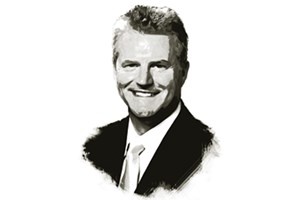Articles By Rob Wright, Chief Editor 2011-2021

-
What Gives With The New Look?3/3/2014
Unless this is your first month as a subscriber to Life Science Leader magazine, undoubtedly you have noticed this issue looks significantly different than previous issues. If you’re the type of person who is not a fan of change, I assure you this new look is restricted to aesthetics and not indicative of some broader alteration to our content or market coverage. Go ahead, flip through a few pages. I think you’ll see the monthly features you have come to enjoy and find valuable are all still there, just with a different design.
-
Don’t Mistake BIO CEO For J.P. Morgan2/13/2014
During my recent visit to the BIO CEO & Investor Conference, February 10 – 11 at the Waldorf Astoria in New York City, there were several tweets (#BIOCEO14) comparing the event to the annual J.P. Morgan Healthcare Conference in San Francisco.
-
Reports Of U.S. Biomedical R&D Demise – A Great Exaggeration2/2/2014
Prior to heading out to the 32nd Annual J.P. Morgan Healthcare Conference in San Francisco last month, I stumbled across several article headlines indicating the United States’ domination of global biomedical R&D was fading. What metric was used to determine this? R&D spend. According to “new” research from the University of Michigan Health System, the U.S. share of the global biomedical R&D business declined from 51 percent to a mere 45 percent from 2007 to 2012. And while Europe remained unchanged at 29 percent, Asia rose from 18 to 24 percent.
-
Lilly’s Approach To The Clinical Trial Paradox2/2/2014
When I sat down with Eli Lilly (NYSE: LLY) and Company’s chief medical officer and coleader of the company’s Development Center of Excellence, Timothy Garnett, it was shortly after the drugmaker’s annual investment community meeting where bankers grilled the leadership team with questions.
-
Actions Speak Louder Than Words At The 2014 J.P. Morgan Healthcare Conference1/27/2014
At the 2014 J.P. Morgan 32nd Annual Healthcare Conference in San Francisco, plenty of writers raced to communicate the latest heard from presentations via tweets, blogs, and news recaps.
-
Mission TransCelerate: Transforming The Drug Development Terrain1/8/2014
During the ill-fated 1970 Apollo 13 mission to the moon, it was astronaut Jack Swigert who alerted ground control that something had gone terribly wrong when he uttered the phrase, “Houston, we’ve had a problem here.” Those same words seem very fitting to the current state of affairs around the skyrocketing costs of drug discovery. Recent estimates place the expense of successfully bringing just one drug to market at between $350 million and $1.2 billion. However, in the last decade, companies having brought 4 to 13 drugs to market have watched the price tag reach stratospheric heights — orbiting $5 billion+. “I think the pain point has reached a threshold that’s no longer bearable,” states Dalvir Gill, Ph.D., CEO of TransCelerate BioPharma.
-
Prevent Drug Development Costs With The KISS Principle1/7/2014
Ever heard of the KISS (keep it simple, stupid) principle? The general idea behind it is that systems perform best when the design is simple, not complex. My favorite example demonstrating the application of KISS, as well as the impact of failing to do so, is captured in a scene in the 1995 movie Apollo 13. An incident necessitates three astronauts use the lunar module (LM), a ship built just for landing on the moon, as a lifeboat to survive.
-
Don’t Be Stupid, Keep It Simple1/1/2014
Ever heard of the KISS (keep it simple, stupid) principle? The general idea behind it is that systems perform best when the design is simple, not complex. My favorite example demonstrating the application of KISS, as well as the impact of failing to do so, is captured in a scene in the 1995 movie Apollo 13. An incident necessitates three astronauts use the lunar module (LM), a ship built just for landing on the moon, as a lifeboat to survive.
-
What It Takes To Be A 5-Category CMO Leadership Award Winner12/20/2013
Prior to the Thanksgiving Holiday, I had the opportunity to sit down with several members of Therapure Biopharma executive leadership team prior to taking a tour of the company’s Mississauga, Ontario (near Toronto) manufacturing facility. For three years in a row, Therapure has been recognized as a CMO Leadership Award Winner — the past two (2012 & 2013) in all five categories. This rare distinction has been made by only two CMOs — Norwich Pharma Services and Therapure. I wanted to know what Therapure president and CEO, Nick Green, has been “putting in the water” to achieve such impressive and consistent results, given the data-driven nature of this particular awards program.









